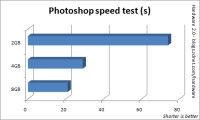The 8GB/64-bit advantage - More RAM doesn't always mean better performance

Running a 64-bit operating system allows you to break the 4GB memory barrier. But are there advantages to loading up with 8GB of RAM?
Following Ed Bott's blog post yesterday on Vista 64-bit, my inbox has been inundated by emails from readers who want to know what the advantages are of gearing up your PC with more than 4GB of RAM.
So, what are the advantages? This is pretty easy to test out. I took my main desktop machine - quad-core Intel Core2 Extreme QX9650 3.0GHz system, 8GB RAM DDR2 800, Vista Ultimate 64-bit - and ran different tests with different memory configurations.
Note: This is my standard desktop rig and apart from running a disk cleanup and a defrag, I did no preparation for this test other than change the amount for memory installed.
I ran three tests with 8GB, 4GB and 2GB of RAM fitted (DDR2 800).
The tests were:
- Photoshop speed test (running Ps CS3)
- PassMark PerformanceTest 6.1
- MAXON CineBench R10
Out of the three tests, one showed a huge advantage to having increased RAM, while two showed little performance gain when running with more than 2GB or RAM.
Photoshop speed test
The results from the Photoshop speed test clearly showed that the more RAM you have, the faster you get your work done.
The system with 8GB of RAM got the image processing done two and a half times faster than the system with 2GB of RAM. Even between 4GB and 8GB, it's clear that running Photoshop with more RAM is advantageous.
PassMark PerformanceTest 6.1
As expected, the difference in score between a system running 8GB of RAM and one running with only 8GB was small when measured with PassMark PerformanceTest 6.1. In fact, the best difference in score between 2GB and 8GB that I measured was around 9%.
Yes, there's an advantage, but only a small one.
CineBench R10
Running CineBench R10 showed even less of a performance gain between 8GB and 2GB than PassMark PerformanceTest 6.1. Here we're dealing with a few percentage points, which is nothing more than noise.
Bottom line ...
So, what's the bottom line here? Well, it's that there are times when breaking the 6GB barrier does offer some compelling advantages, but these are restricted to certain applications (for example, Photoshop, VMware Workstation if you run multiple virtual machines with lots of RAM).
Unless you have a specific need for fitting more than 4GB of RAM then chances are that you don't need any more and won't really gain much from fitting it.
Side note: What you do notice from stepping up from 2GB to 4GB to 8GB to RAM is that with each step the hard disk is being thrashed less and less because there's less for the swap file to do. Relying less on a swap file does make the system feel perkier overall, but the actual effect on performance is, as we've seen, small.
More RAM doesn't always mean better performance.
Thoughts?
